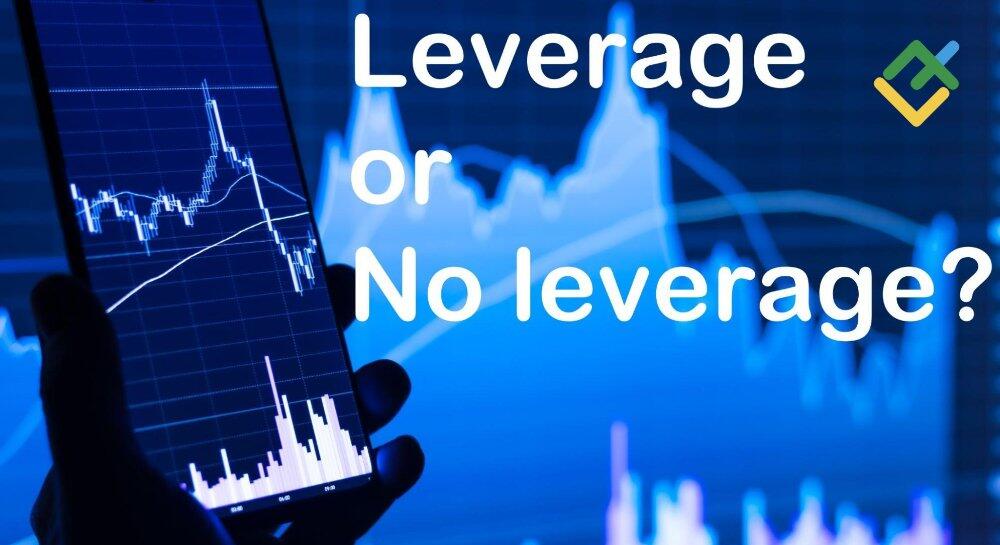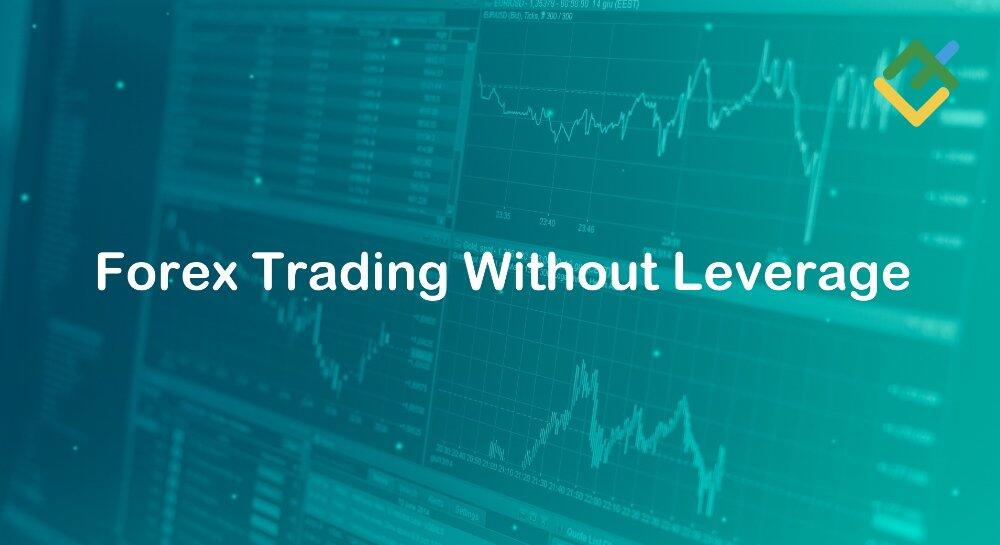The foreign exchange market is a popular and lucrative way for beginner traders to make money. However, when using leverage there's no guarantee that you'll be able to take full advantage of your gains as it can lead beginners down an economic rabbit hole if they don't know what type or size ratio will work best with their chosen strategy. In this article, we will explore what is leverage and no leverage trading, their benefits and drawbacks, as well as ways to trade without leverage on the Forex market.
The article covers the following subjects:
Major takeaways
| Main Thesis | Insights and Key Points |
|---|---|
| Defitition: | Forex trading without leverage means trading based on one's own capital, not borrowing, limiting potential losses to the invested amount. |
| Risks: | Leverage in forex trading without leverage can amplify losses, pose margin call risks, and be challenging to control, especially for novices. |
| Can you Trade Forex Without Leverage? | Yes, one can engage in forex trading without leverage, but it demands more capital, time, and experience, emphasizing disciplined trading. |
| Pros & Cons: | Trading forex without leverage has pros like limited losses and enforced discipline, but cons include more capital requirement and low profitability. |
What is Leverage
Leverage trading, also known as margin trading, is a trading strategy where investors use borrowed money — from a broker or another party — to trade assets. This type of financing allows them to control higher positions than what their trading account balance would allow if they were to pay for the asset outright. Trading on leverage can magnify both your profits and losses.
The great thing about trading with leverage is that it can give you large profits, but also high potential losses. If a trader invests $1 and places orders for 100 shares at a 1:100 leverage ratio (which means there's an extra 99 others who will be buying or selling), then if the market follows the trader’s expectations he will benefit from an increased profit, but should something go wrong his losses may exceed the amount of the initial investment.
Leverage example
Let’s consider an example of leverage Forex trading and trading Forex without leverage in a situation when a trader has a deposit of $1000 in his individual Forex account.
Why Trading With Leverage Could Be Dangerous?
Leverage is a great tool that allows Forex traders to get a bigger exposure and increase their potential profits. However, it also comes with certain risks. Here are the most significant of them.
Amplified losses. Investors who trade with leverage can lose more money than they have in their accounts. If the value of your investment falls by 50%, for example, and the leverage ratio is 1:100, you will lose all of your money.
The risk of a margin call. When trading with leverage, you are essentially borrowing money from your Forex broker to finance your trade. If the value of your investment falls, you will not only lose the money that you have invested but also the money that you have borrowed. This can lead to a rapid depletion of your account balance and, in some cases, margin calls from your broker.
Difficult to control. High leveraged trades can lead to large swings in the value of your investment. These swings can be difficult to manage and may cause you to make impulsive decisions that you later regret.
Leverage can therefore be a very dangerous tool, especially for novice traders who may not have the experience or knowledge to trade successfully on margin.
Can you Trade Forex Without Leverage?
Yes, Forex trading without leverage is possible. This is known as no leverage trading. However, trading currencies without leverage is not an easy task. It will take more time, money, and experience if you want any type of profit from this market.
A novice trader who only deposits $100 must trade 1:100 which means they have to invest ten thousand dollars in order for their investment to make back the same profit as from the leveraged trade.
The main benefit of trading without leverage on the Forex market is that it limits your losses. If the value of your investment falls, you will only lose the money that you have invested and not the money that you have borrowed. This type of trading is therefore much less risky than trading on margin.
Another benefit of trading without leverage is that it forces you to be more disciplined with your trading. When you are not able to control large positions, you will be less likely to take unnecessary risks. This can lead to more consistent profits over time.
However, considering it from another perspective, if you invest $10 000 and receive 5% or 10% profit, it would provide you with an income of $500-$1000 monthly. A usual job could give you the same but without so many risks of losses.
Trading without leverage would be a reasonable option only in some cases:
If an investor trades instruments on CFD, oil & metals, and other financial markets where the cost of minimum lots is usually lower than foreign exchange markets while the volatility is higher. This way investors could earn a significant profit percentage even without using the margin.
A trader has a large initial capital (more than $10 000). Otherwise, he will not be able to open more than 2-3 positions and use various financial assets to diversify the portfolio.
Institutional trading.
Institutional Trading
Institutional traders are companies that invest money on behalf of large investment, pension, and insurance funds. Institutional investors tend to have much more purchasing power than individual customers do - they can buy billions in stocks at once. They also tend to be more experienced and know how to manage their risk better. Thus, they are the ones who are usually involved in Forex trading without leverage.
Moreover, trading with no leverage doesn’t mean that institutional investors take less profit. Conversely, they benefit from huge returns. With their direct presence in the market and huge analytical apparatus, institutional investors are one step ahead of private traders. They can maximize profitability thanks to this access that they have without leverage through Forex brokers or other intermediaries like them who take a percentage off each trade made by an investor's funds as fees for themselves so there is no need when dealing directly with these types.
Is it Possible to Trade CFDs without Leverage?
CFDs are derivative contracts that allow speculators to trade the underlying asset without actually owning it. Just like Forex, it’s possible to trade CFDs without leverage but it is not recommended and usually not allowed by many brokers. Leverage allows traders to enter into larger positions than they would be able to with their own trading capital, amplifying both profits and losses. While trading without leverage does limit potential profits, it also significantly reduces the risk of facing sizable losses. For this reason, some investors choose CFD trading without leverage, particularly if they are new to the market or if they are trading volatile assets. Ultimately, the decision of whether or not to use leverage is a personal one and should be based on the trader's risk tolerance and investment objectives.
No Leverage Day Trading: Pros & Cons
Just like anything else in life, no leverage trading has its own set of pros and cons. Let's take a look at some of the most important ones.
Advantages | Disadvantages |
|
|
|
|
|
|
|
Regardless of whether you decide to trade with or without leverage, it’s crucial to be aware of the risks involved and make sure they comply with your trading behavior, strategy, and risk management plan. By doing so, you increase the chances of having a positive trading experience.
Conclusion: to Leverage or not to Leverage
Both leverage and no leverage trading come with their benefits and drawbacks. Leverage can be a helpful tool if used correctly, however, it can also amplify traders’ losses if the market moves against their expectations. No leverage trading, on the other hand, comes with significantly lower risks but with lower profits as well.
Whether or not to opt for leverage Forex trading is a decision that every trader will have to make for himself. There is no right or wrong answer as it depends on individual trading style, risk tolerance, and capital availability. If you are new to Forex trading, it’s reasonable to start out with a small account and trade without leverage until you get more experience. Moreover, it’s advisable to train in a demo account. This will help you limit your losses and learn how to manage your risk better. Once you feel more confident in your trading abilities, you can then start to increase the amount of leverage that you use. Just remember to always use it responsibly.
Trading Without Leverage FAQ
It is possible to make money while trading Forex without leverage. However, it should be noted that it will typically result in smaller profits (or losses) than trading with leverage, but it does allow for greater control over one's account. This is because to trade without leverage, investors should put up the full amount of the trade themselves. To mitigate trading risks it’s also recommended to consult an independent financial advisor.
One method is to purchase shares directly from a company. This can be done through a broker or by participating in a direct stock market purchase plan. Another way to get involved in stock trading without leverage is to purchase them through a mutual fund. Mutual funds are managed by professionals and allow investors to pool their resources. This enables them to diversify their portfolios and reduce their risk. Finally, some investors choose to purchase stocks through an exchange-traded fund. ETFs are similar to mutual funds, but they are traded on an exchange like a stock. As a result, they offer the benefits of both mutual funds and stocks.
There is no one-size-fits-all answer to this question, as the best trading platform for Forex trading without leverage will depend on investors’ individual needs and preferences. However, some factors that might be considered before opening retail investor accounts include the fees charged by the platform, the range of assets available for trading, negative balance protection features, and the level of customer support offered. In addition, it is important to choose a platform that is user-friendly and offers a demo account so that you can test out the features before committing to real trade.
Both trading Forex without leverage and with it is possible. Some people feel more comfortable trading with leverage, while others do not. It really comes down to personal preference. Trading with no leverage is usually preferred by beginner investors, who are trying to reduce this way their losses, or by speculators on highly volatile financial markets (crypto, various derivatives, etc.) where trading with no leverage or small leverage could result in substantial profits.
P.S. Did you like my article? Share it in social networks: it will be the best "thank you" :)
Ask me questions and comment below. I'll be glad to answer your questions and give necessary explanations.
Useful links:
- I recommend trying to trade with a reliable broker here. The system allows you to trade by yourself or copy successful traders from all across the globe.
- Use my promo code BLOG for getting deposit bonus 50% on LiteFinance platform. Just enter this code in the appropriate field while depositing your trading account.
- Telegram chat for traders: https://t.me/litefinancebrokerchat. We are sharing the signals and trading experience
- Telegram channel with high-quality analytics, Forex reviews, training articles, and other useful things for traders https://t.me/litefinance

The content of this article reflects the author’s opinion and does not necessarily reflect the official position of LiteFinance. The material published on this page is provided for informational purposes only and should not be considered as the provision of investment advice for the purposes of Directive 2004/39/EC.












